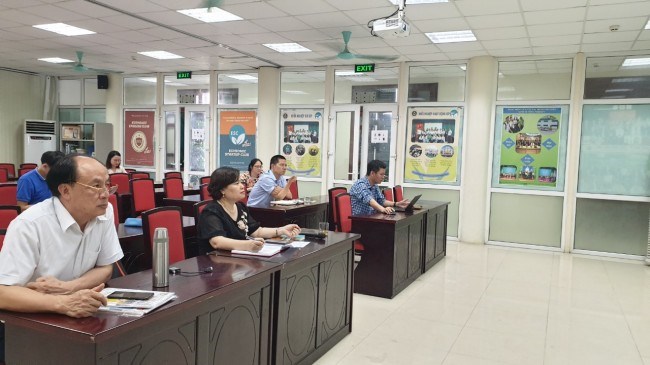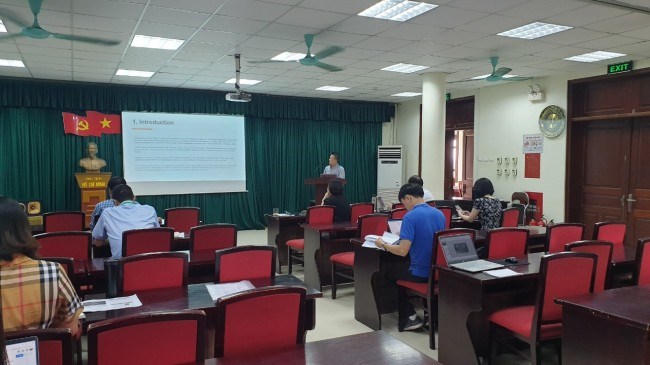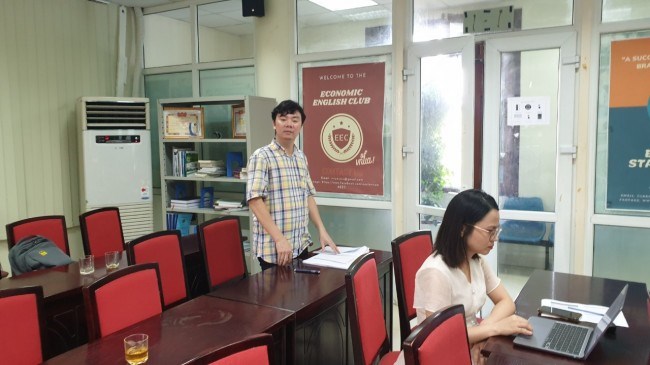On the afternoon of May 22, 2023. The Specialization research group on Rural Development and Management held a scientific seminar, in which there was a presentation by Dr. Nguyen Minh Duc with the topic "Influence of Payment for Forest Ecosystem Services policy on the forest protection behaviour of local people in the Northwest region of Vietnam" at conference room 404, Faculty of Economics and Rural Development, Vietnam National University of Agriculture (VNUA).
Attending the seminar, there were Assoc. Prof. Dr. Nguyen Thi Minh Hien, Dean of Faculty of Economics and Rural Development, leader of the Specialization Research Group of Rural Development Management; Dr. Nguyen Huu Nhuan, Vice Dean of the Faculty; and a large number of staff, lecturers, researchers, and students from majors of Agricultural Economics, Financial Economics, Economics, Economic Management, and Rural Development.
    |
 |
| Assoc. Prof. Dr. Nguyen Thi Minh Hien; Dr. Nguyen Huu Nhuan; and Prof. Dr. Nguyen Van Song attend the seminar |
Being initiated in the 1990s, Payment for Ecosystem Services (PES) has emerged as a mechanism that brings great hope for nature conservation and sustainable provision of ecosystem services (Wunder et al., 2018). PES’s principle is to create an institutional market for service users to buy ecosystem services from service providers (Wunder, 2008). A PES policy in Vietnam is Payment for Forest Ecosystem Services (PFES) has been officially implemented as a nationwide program in 2011. After more than a decade of implementation, Vietnam PFES has been an interesting topic of many studies.
    |
 |
| Dr. Nguyen Minh Duc delivers the presentation |
In the presentation, Dr. Nguyen Minh Duc gave an overview on the characteristics of the policy of payment for forest environmental services and its implementation in the Northwest region of Vietnam and examined how the characteristics of the policy influence the attitudes, knowledge and behaviours to protect forests of local people as forest owners.
Dr. Nguyen Minh Duc then showed the research finding that the reason to argue that PFES being implemented in the Northwest region is a forest protection mechanism based on quasi-PES approach. At the household level, the economic incentives that the policy has created in changing people's behaviour are small and statistically significant.
However, with a low payment, inadequately commensurate with people's efforts to protect forests, PFES payment has a lower impact than the impact of CFM enforcement effectiveness and local people's perception of the value of forest. Community governance is not a panacea and its effectiveness depends on the local context and its interaction with the particular PES program (McGinnis and Ostrom, 2014; Ostrom, 2007). The research findings show that the PFES policy has partly succeeded.
If only the forest is allocated to the community for management, and the community simply participates in paying PFES to the people, it has no obvious effect on improving people's perception about the value of forests as well as on forest protection behaviour.
However, community participation in PFES implementation and forest management do have a positive effect when it can develop and effectively implement monitoring, rewarding and punishment mechanisms in forest management.
The remarkable success of the policy is that it has taken advantage of people's social organizations in promoting people's perception toward the value of forests. This result supports the view of To and Dressler (2019) arguing that PFES is a tool for the state through its social organizations to maintain to control the forestry sector in general, and to achieve the goal of forest protection in particular.
    |
 |
| Attendees asked questions |
In addition, in the seminar, many questions related to Forest Ecosystem Services policy on the forest protection behaviour were also discussed by leturers and researchers of the Faculty of Economics and Rural Development. The seminar ended at 17:00 on the same day.
Dong Thanh Mai, Specialization Research Group of Rural Development Management
References:
McGinnis, M.D., Ostrom, E., 2014. Social-ecological system framework: initial changes and continuing challenges. Ecology & Society 19.
Ostrom, E., 2007. Self-governance and forest resources. Terracotta reader: A market approach to the environment, 131-154.
To, P., Dressler, W., 2019. Rethinking ‘Success’: The politics of payment for forest ecosystem services in Vietnam. Land Use Policy 81, 582-593.
Wunder, S., 2008. Payments for environmental services and the poor: concepts and preliminary evidence. Environment and development economics 13, 279-297.
Wunder, S., Brouwer, R., Engel, S., Ezzine-de-Blas, D., Muradian, R., Pascual, U., Pinto, R., 2018. From principles to practice in paying for nature’s services. Nature Sustainability 1, 145-150.